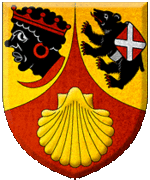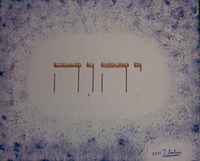 On Friday, 8 August 2008, the Congregation for Divine Worship and the Discipline of the Sacraments communicated to the relevant ecclesial authorities (i.e., Bishops’ Conferences and therefore Diocesan Bishops) that the Holy Father in accord with the same congregation and the Congregation for the Doctrine of the Faith, the norms for the liturgical use of “…the Divine Name signified in the sacred tetragrammaton….” The document is called “Letter to the Bishops’ Conferences on the ‘Name of God'” (Prot. N. 213/08/L). The directives are clear and concise. The Letter is issued under the signatures of Francis Cardinal Arinze and Archbishop Albert Malcolm Ranjith and dated 29 June 2008. The directives:
On Friday, 8 August 2008, the Congregation for Divine Worship and the Discipline of the Sacraments communicated to the relevant ecclesial authorities (i.e., Bishops’ Conferences and therefore Diocesan Bishops) that the Holy Father in accord with the same congregation and the Congregation for the Doctrine of the Faith, the norms for the liturgical use of “…the Divine Name signified in the sacred tetragrammaton….” The document is called “Letter to the Bishops’ Conferences on the ‘Name of God'” (Prot. N. 213/08/L). The directives are clear and concise. The Letter is issued under the signatures of Francis Cardinal Arinze and Archbishop Albert Malcolm Ranjith and dated 29 June 2008. The directives:
1. In liturgical celebrations, in songs and prayers the name of God in the form of the tetragrammaton YHWH is neither to be used or pronounced.
tetragrammaton YHWH is neither to be used or pronounced.
2. For the translation of the Biblical text in modern languages, destined for liturgical usage of the Church, what is already prescribed by n. 41 of the Instruction Liturgiam authenticam is to be followed; that is, the divine tetragrammaton is to be rendered by the equivalent of Adonai/Kyrios: “Lord”, “Signore”, “Seigneur”, “Herr”, “Señor”, etc.
3. In translating, in the liturgical context, texts in which are present, one after the other, either the Hebrew term Adonai or the tetragrammaton YHWH, Adonai is to be translated “Lord” and the form “God” is to be used for the tetragrammaton YHWH, similar to what happens in the Greek translation of the Septuagint and in the Latin translation of the Vulgate.
The cardinal and the archbishop explain in the first part of the letter the value of remaining faithful to the consistent teaching and tradition of the Church. Here one can say that in following this teaching Catholics have continuity of faith: legem credendi lex statuat supplicandi (often abbreviated by the bromide of lex orandi, lex crendendi). The implication of this teaching, therefore, has much to do with Christology, liturgical theology, catechetics and interfaith dialogue with our Jewish brothers and sisters. I think the final paragraph bears prayerful consideration because of the Church’s objectivity:
Avoiding pronouncing the tetragrammaton of the name of God on the part of the Church has therefore its own grounds. Apart from a motive of a purely philological order, there is also that of remaining faithful to the Church’s tradition, from the beginning, that the sacred tetragrammaton was never pronounced in the Christian context nor translated into any of the languages into which the Bible was translated.
As commentary, the teaching presented by the Church was taught to me and my classmates at Notre Dame High School (W. Haven, CT) in Mr. William Parkinson’s Old Testament class in 1983 [Parkinson is now a deacon of the Archdiocese of Hartford] So, I think we were fortunate to have had the correct catechesis and praxis at that time in our Church’s history. Having said this, I wonder about the arrogance (perhaps mere ignorance?) of Christians using of the Divine Name incorrectly and I wonder how long it will take publishers to change their editorial policy. I am thinking of the dreadful liturgical songs still used in parishes.